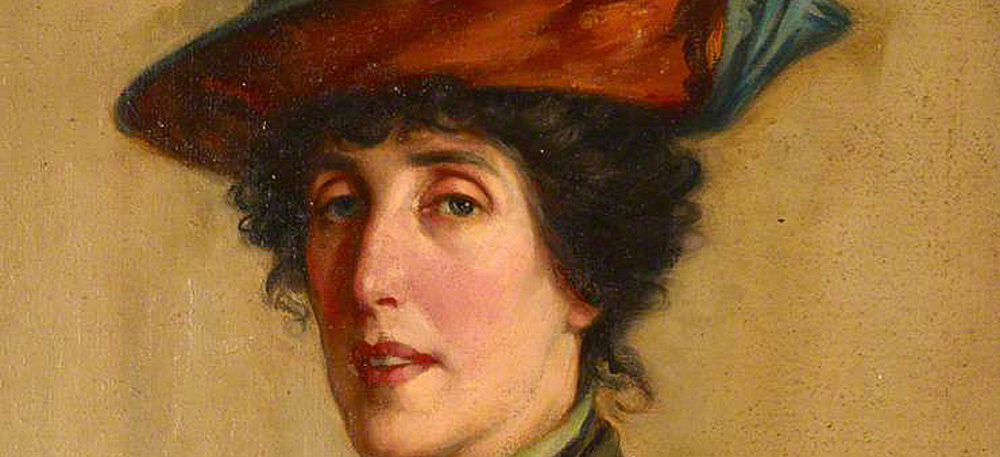
 |
| I will nurse men for life, but not to send them back to the trenches | WOMEN WORKING FOR PEACE |
|
THE MEN WHO SAID NO | ROAD TO CONSCRIPTION | CONSCIENTIOUS OBJECTION | PRISONS | SENTENCED TO DEATH | TRIBUNALS | WIDER CONTEXT | INDEX |
||
 |
||
| CLARA GILBERT COLE | WOMEN WORKING FOR PEACE | |
|
Clara Gilbert was born on 4th December 1868, the daughter of a boot manufacturer who got into financial difficulties because he refused to produce anything shoddy. She was left an orphan with no means, and became a postal worker in Manchester, where she met her husband, the artist Herbert Cole, and became Clara Gilbert Cole on her marriage. They were both closely involved with the suffragist movement, and Clara’s work and campaigning is mentioned by Sylvia Pankhurst in her book, The Home Front. She describes Clara ‘with her unusual slender loveliness, her deft fingers and vivid imagination’ as ‘like a caged bird in the post office.’ After her marriage, they moved to London where Herbert developed his career with book illustrations and teaching art at Camberwell School of Art. Clara brought up their son Philip, later a talented architect, wrote poems and ‘filled her mind with social causes.’ They were stunned by the onset of the war. When conscription was introduced in 1916 Clara Gilbert Cole went to Trafalgar Square with a badge saying Stop the War, and a banner against conscription. She was arrested and brought to court though the charge was dropped - even though she returned to demonstrate many times. In her short book ‘The objectors to conscription and war: a record of their suffering and sacrifice, their letter and tribunal appeals, their testimony for liberty of conscience’ published in 1936, she said: ‘On 11th July 1915, Sunday, I went into Trafalgar Square with a linen placard bearing the words: “Men and Women of England, Arbitration finally settles all wars. If at the end of a war, why not at the beginning? If not at the beginning why not now? Demand terms of settlement from our Government as the German people are doing.” ‘I have a footnote to this in a book I kept with signatures of men opposed to war. The note reads thus: “Police did not interfere, but public was hostile and bloodthirsty in its remarks, wished to kill every Prussian, some said even women and children. The British soldiers did not make these remarks, though there were many about.” This wasn’t her first or last action against the war. She had previously nursed wounded soldiers in her local hospital until she realised that ‘I will nurse men for life, but not to send them back to the trenches.’ She wrote a pamphlet, War Won’t Pay, and distributed it to soldiers and civilians. The police took the copies from her, but didn’t arrest her, thinking her driven crazy by the sight of wounded men. She wrote a leaflet ‘To the Women of the World’, appealing to women to help end the war. In 1915 she set up a League against War and Conscription through which she became in contact with the Stop the War Committee, and with Mrs. A. Cunningham in her ‘Women’s Union for Peace’. She appealed for people to join a ‘united protest in case Conscription is thrust upon us’ and put little advertisements in the Labour Leader. When the No Conscription Fellowship was formed, she was able to add her 500 names to their lists. With Rosa Hobhouse she set out on a peace pilgrimage around the country - they were arrested in Kettering after five days walking through Northamptonshire and Bedfordshire distributing anti-war leaflets, and served three months in Northampton prison. Her only comment on this was: ‘The cheerful and sympathetic comradeship of Rosa made my imprisonment very much easier than it would otherwise have been. It was my only rest during the war.’ Clara described her reasons for this work: ‘I have been actively against war since I saw in August, 1914, on the Pilgrims Road in Kent, the “Trek of the Reserves”, with their cannons and poor, restive, fear stricken horses. I have been passively against war ever since I could reason.” Before the war was over, her son had reached military age and became a conscientious objector, imprisoned in Wormwood Scrubs. ‘From his cell he sent delicate pen drawings to his parents on the blue official sheet of paper, his sole monthly communication with the outer world.’ Even after the war was over, there were conscientious objectors still in prison, including Philip who was released in April 1919. She went and stood outside Wandsworth prison during the day for weeks from February 1919, to remind people they needed to be released. Her placard read: ‘We protest against the persecution and imprisonment of Conscientious Objectors to war.’ Another placard called Christ ‘The Greatest Conscientious Objector’ and reminded people that he said ‘Thou shalt not kill’. She credits other women for supporting this work, particularly Mrs Chapman of Wandsworth who joined her sometimes on protests. Another, Mrs Cahill, was in the Dulwich No Conscription Fellowship group to which Clara Cole belonged, and worked unceasingly visiting prisoners, ‘taking up any and every task possible.’ Later in her life Clara gravitated towards the anarchist movement. She is remembered for shouting out ‘God Save the People’ as God Save the Queen was being played at a concert. She died on 4th February 1956 at the age of 87 Poems by Clara Cole WHEN
|
|
|